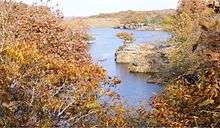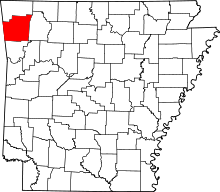Lincoln, Arkansas
| Lincoln, Arkansas | |
|---|---|
| City | |
 | |
 Location in Washington County and the state of Arkansas | |
| Coordinates: 35°56′54″N 94°25′26″W / 35.94833°N 94.42389°WCoordinates: 35°56′54″N 94°25′26″W / 35.94833°N 94.42389°W | |
| Country | United States |
| State | Arkansas |
| County | Washington |
| Incorporated city | 1907 |
| Government | |
| • Type | Mayor-Council |
| • Mayor | Rob Hulse |
| Area | |
| • Total | 1.8 sq mi (4.6 km2) |
| • Land | 1.8 sq mi (4.6 km2) |
| • Water | 0.140625 sq mi (0 km2) |
| Elevation | 1,473 ft (449 m) |
| Population (2014) | |
| • Total | 2,413 |
| • Density | 973.3/sq mi (380.9/km2) |
| Time zone | Central (CST) (UTC-6) |
| • Summer (DST) | CDT (UTC-5) |
| ZIP code | 72744 |
| Area code(s) | 479 |
| FIPS code | 05-39970 |
| GNIS feature ID | 0077500 |
| Website | www.lincolnarkansas.com |
Lincoln is a city in Washington County, Arkansas, United States. The population was 1,752 at the 2000 census. It is part of the Fayetteville–Springdale–Rogers, AR-MO Metropolitan Statistical Area.
Geography
Lincoln is located at 35°56′54″N 94°25′26″W / 35.94833°N 94.42389°W (35.948466, -94.423920).[1]
According to the United States Census Bureau, the city has a total area of 1.8 square miles (4.7 km2).
Lincoln Lake is 400 acres, 90 of which is water. It offers pristine water recreation, rock climbing, mountain biking, hiking, fishing and stunning photographic opportunities at Lincoln Lake.[2]
Lincoln is about 25 miles southwest of Fayetteville and about 8 miles east of the Arkansas-Oklahoma border.
Demographics
| Historical population | |||
|---|---|---|---|
| Census | Pop. | %± | |
| 1910 | 292 | — | |
| 1920 | 534 | 82.9% | |
| 1930 | 687 | 28.7% | |
| 1940 | 720 | 4.8% | |
| 1950 | 771 | 7.1% | |
| 1960 | 820 | 6.4% | |
| 1970 | 1,023 | 24.8% | |
| 1980 | 1,422 | 39.0% | |
| 1990 | 1,460 | 2.7% | |
| 2000 | 1,752 | 20.0% | |
| 2010 | 2,249 | 28.4% | |
| Est. 2015 | 2,431 | [3] | 8.1% |
As of the census[5] of 2000, there were 1,752 people, 723 households, and 472 families residing in the city. The population density was 983.2 people per square mile (380.0/km²). There were 798 housing units at an average density of 447.8 per square mile (173.1/km²). The racial makeup of the city was 91.78% White, 2.57% Native American, 0.06% Asian, 2.57% from other races, and 3.03% from two or more races. 5.08% of the population were Hispanic or Latino of any race.

There were 723 households out of which 29.7% had children under the age of 18 living with them, 50.2% were married couples living together, 12.0% had a female householder with no husband present, and 34.7% were non-families. 30.8% of all households were made up of individuals and 17.0% had someone living alone who was 65 years of age or older. The average household size was 2.42 and the average family size was 3.00.
In the city, the population was spread out with 26.7% under the age of 18, 8.6% from 18 to 24, 26.7% from 25 to 44, 21.3% from 45 to 64, and 16.8% who were 65 years of age or older. The median age was 35 years. For every 100 females, there were 88.6 males. For every 100 females age 18 and over, there were 84.1 males.
The median income for a household in the city was $27,639, and the median income for a family was $37,102. Males had a median income of $26,860 versus $18,958 for females. The per capita income for the city was $14,232. About 12.7% of families and 15.8% of the population were below the poverty line, including 18.5% of those under age 18 and 11.8% of those age 65 or over.
Community
Lincoln is home to the Annual Arkansas Apple Festival, held every year the first weekend of October. For many years, it has attracted visitors to the area who come to see the arts and crafts of the Ozarks. Apple growing was once a major agricultural industry in Lincoln which has recently declined due to changing climate conditions and high costs of upkeep. In spite of the decline, Lincoln still hosts a successful Apple Festival that welcomes visitors and vendors from all over the nation. Serving free apple slices and a swig of Apple Cider to sightseers.
Local Apple farmers developed the following in the Area.
- Collins’ Red (aka Collins, Champion Red, Champion, Reagan’s Red)—found by chance in a field near Lincoln; commercially propagated around 1886; a good colored fruit which keeps well, if kept properly
- Howard Sweet—the seedling is thought to have come from Earls Holt’s Cane Hill nursery after the Civil War; grown near Cincinnati by Mr. Howard; a sweet, highly colored dessert apple; the tree has a heavy bloom
- Oliver Red (aka Oliver, Senator)—originated in Washington County; a yellow-skinned fruit washed with bright red; harvested in early September; a good dessert apple
The city of Lincoln was founded in 1907, and recently hosted a centennial celebration in July 2007.
Lincoln is also home to the Arkansas Country Doctor Museum, which includes a collection of medical instruments and personal artifacts from 1930s to 1980's.
The Northwest Arkansas Battle men's full contact football team has called Lincoln home since 2012. The team is part of the Central Football League and plays their season from March through June each year.
Library
Lincoln Public Library was demolished and rebuilt Lincoln Library thanks to a bond, grants, and in-kind services. It is 10,200+ square feet, features 108 computers, tablets, and laptops. The public library has two meetings rooms, a demonstration kitchen, genealogy section and free internet extending into the square. The library hosts multiple services including Ancestory.com, Social Security resource site, GED and Continuation of Education courses. The library has a linguistics center featuring 20 languages.
Parks and Recreation
The City of Lincoln has an extensive parks and recreation system in place. with a full-time parks and recreation worker and several volunteer staff who assist in the care and development of the city parks.
- Lincoln South Park was established in 1970 with a Fun Park grant with the City of Lincoln and the State of Arkansas Parks and Tourism. It is located on the south side of town and hosts playground equipment, basketball hoops and a walking trail and other.
- Historic 62 Roadside Park is located on the northeast side of US 62 as you are coming into the east side of town in Lincoln. The site is scheduled to be upgraded into a veteran’s park in the near future. It is also the location of a historic cemetery that is attached to the north side of the park. Landscaping and focus groups on the park’s future were formed in 2014 and a list of veterans is being compiled for the new future memorial. There is no scheduled date for the memorial or rededication of the park.
- Lincoln Lake, located north of town, is a jewel of our parks and recreation system, featuring boating, hiking, rock climbing, bird watching, picnics and many other activities. It features full guest wireless access in the parking and boating areas and some areas of the hiking trails may also receive a signal.
- Bumblebee Park was added in 2013 with funds received by the Arkansas Parks and Tourism Fun Park Grant, City of Lincoln funds, city- supported staff resources and an additional grant procured by the Lincoln Area Chamber of Commerce to expand the equipment in 2014. The name was chosen by the council after a submission poll and popularity vote was conducted on Facebook and by paper submissions. The park opened in the first part of 2014 and was expanded that summer to include additional resources. The park features a full basketball court, picnic pavilion, playground equipment and swings. It features a green space for egg hunts, kite flying, and other activities. The grounds were expanded with additional playground equipment and barbecue grills with the second grant. The park has become a great addition to our parks department.

- Ball Multiplex Park is located on the north end of town and hosts multiple baseball and softball fields, batting cages, practice areas and is tied to the football and soccer areas of the Lincoln Schools. There is a bridge that links the field to the school playgrounds and ball fields. Combined with practice football fields and soccer it a very impressive ball complex.
- Lincoln Town Square & Community Building — Formerly the American Legion building, the city acquired the grounds and restored the building as the town community center. It features free wireless and is the hub of the annual Arkansas Apple Festival, Lincoln Rodeo Street Dance, car shows, Christmas and Halloween festivities.
- Town Garden & Park — In 2014, the city decided to begin a community driven garden. Volunteers from the city, school and community have come together to begin a town garden to grow fresh garden produce to better support the town through its local charity organizations. The garden will make its first attempt in 2015 and additional growth areas are planned. The garden is in its early stage and will grow and adapt to serve the community in the future.
- Green Spaces — The town also hosts multiple green spaces and activities throughout the town. Horseshoe pits are located on the east side of the water department and flower beds and green spaces are being installed in areas throughout the city as the areas are identified and developed.
Schools
Lincoln Elementary School, Lincoln Middle School, Lincoln High School, and Lincoln Academic Center of Excellence make up the Lincoln School District. Lincoln recently completed a large, beautiful, state-of-the-art, multimillion-dollar high school. The school mascot is the Wolf. The school colors are maroon and white. In 2007, the Lincoln Cheerleading team won the State Championship in Little Rock, Arkansas. The middle school houses the Lincoln Youth Adventure Club. This afterschool enrichment program focuses on exposing children to outdoor activities such as rock climbing, mountain biking, canoeing, hiking, and disc golf. The middle school also has an awarding winning chess club. In 2015, the group had a 6th grader win first place in the unrated division at the United States Chess Championship in Nashville, TN. In addition, the club won the first place team trophy in the unrated division.
Notable people
- Lance Eads, Republican member of the Arkansas House of Representatives for District 88 in Washington County; former resident of Lincoln[6]
- Ryan Mallett, Quarterback currently playing for the Baltimore Ravens of the National Football League. Mallett attended Elementary School at Lincoln Consolidated School District, where his father, Jim Mallett was a coach, and his mother Debbie Mallett was a High School Teacher.
References
- ↑ "US Gazetteer files: 2010, 2000, and 1990". United States Census Bureau. 2011-02-12. Retrieved 2011-04-23.
- ↑ City of Lincoln, Flood Plain Management
- ↑ "Annual Estimates of the Resident Population for Incorporated Places: April 1, 2010 to July 1, 2015". Retrieved July 2, 2016.
- ↑ "Census of Population and Housing". Census.gov. Retrieved June 4, 2015.
- ↑ "American FactFinder". United States Census Bureau. Retrieved 2008-01-31.
- ↑ "Lance Ronaco Eads". intelius.com. Retrieved April 11, 2015.
External links
- City of Lincoln Website
- Lincoln Consolidated School District Website
- Arkansas Apple Festival Website
- Lincoln, Arkansas Website
- Lincoln Area Chamber of Commerce
